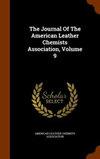不同植物鞣羊皮的热解动力学行为研究
IF 0.5
4区 工程技术
Q4 CHEMISTRY, APPLIED
Journal of The American Leather Chemists Association
Pub Date : 2023-08-01
DOI:10.34314/jalca.v118i8.8089
引用次数: 0
摘要
本研究通过热重(TG)分析法研究了使用可水解单宁(塔拉和栗木提取物)和缩合单宁(坚木和含羞草提取物)鞣制的皮革的热解行为。热重/衍生热重分析(DTG)结果表明,塔拉和栗木鞣制样品的热稳定性比坚木和含羞草鞣制样品差。为了研究热解动力学,在不同加热速率下进行了热重分析实验。采用 Flynn-Wall-Ozawa (FWO) 和 Friedman (FR) 两种方法计算样品的热解活化能(Eα)。结果发现,植鞣革样品的平均 Eα 位于 191.7-206.1 kJ/mol 的范围内。随后,根据平均 Eα 用 FR 方法计算了样品的热力学参数(前指数因子、吉布斯自由能、焓和熵)。栗木鞣革、塔拉鞣革、栲胶鞣革和含羞草鞣革的吉布斯自由能分别为 176.9 kJ/mol、179.8 kJ/mol、179.3 kJ/mol 和 178.2 kJ/mol。平均焓与 Eα 之间的差值小于 5 kJ/mol,这表明热解过程有利于产物的形成。四种植物鞣革样品的平均熵(ΔS)均为正值,这表明样品很容易发生热解。这项研究可为优化植鞣革废料热解提供理论指导。本文章由计算机程序翻译,如有差异,请以英文原文为准。
Study on the Pyrolysis Kinetic Behaviors of Different Vegetable-Tanned Sheepskin Leathers
The pyrolysis behaviors of leathers tanned with hydrolyzable tannins (Tara and Chestnut extracts), and condensed tannins (Quebracho and Mimosa extract) were studied by Thermogravimetric (TG) analysis in the present work. The TG/derivative thermogravimetry (DTG) results showed that the thermal stability of Tara- and Chestnut-tanned samples is poorer than that of Quebracho- and Mimosa-tanned ones. In order to study pyrolysis kinetics, TG experiments at different heating rates were carried out. Two methods of Flynn-Wall-Ozawa (FWO) and Friedman (FR) were employed to calculate the pyrolysis activation energy (Eα) of the samples. It was found that the average Eα of the vegetable-tanned samples is located at the range of 191.7-206.1 kJ/mol. The thermodynamic parameters (pre-exponential factor, Gibbs free energy, enthalpy, and entropy) of the samples were subsequently calculated based on the average Eα by the FR method. The Gibbs free energies of the Chestnut-, Tara-, Quebracho-, and Mimosa-tanned leathers were 176.9 kJ/mol, 179.8 kJ/mol, 179.3 kJ/mol, and 178.2 kJ/mol, respectively. The difference between the average enthalpies and the Eα is less than 5 kJ/mol, which indicated that the pyrolysis process is conductive to the product formation. The mean entropy (ΔS) of the four vegetable-tanned samples is all positive, which suggested that the pyrolysis of the samples could easily take place. This work might provide theoretical guidance for the optimization of vegetable-tanned leather waste pyrolysis.
求助全文
通过发布文献求助,成功后即可免费获取论文全文。
去求助
来源期刊

Journal of The American Leather Chemists Association
工程技术-材料科学:纺织
CiteScore
1.30
自引率
33.30%
发文量
29
审稿时长
3 months
期刊介绍:
The Journal of the American Leather Chemists Association publishes manuscripts on all aspects of leather science, engineering, technology, and economics, and will consider related subjects that address concerns of the industry. Examples: hide/skin quality or utilization, leather production methods/equipment, tanning materials/leather chemicals, new and improved leathers, collagen studies, leather by-products, impacts of changes in leather products industries, process efficiency, sustainability, regulatory, safety, environmental, tannery waste management and industry economics.
 求助内容:
求助内容: 应助结果提醒方式:
应助结果提醒方式:


